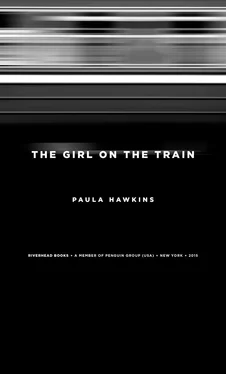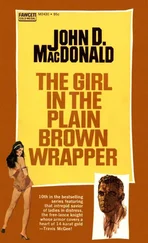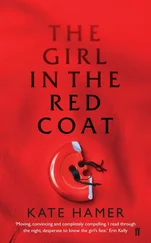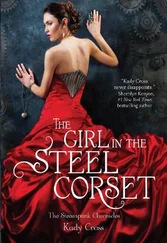Paula Hawkins - The Girl on the Train
Здесь есть возможность читать онлайн «Paula Hawkins - The Girl on the Train» весь текст электронной книги совершенно бесплатно (целиком полную версию без сокращений). В некоторых случаях можно слушать аудио, скачать через торрент в формате fb2 и присутствует краткое содержание. Год выпуска: 2014, Издательство: Penguin Group US, Жанр: Старинная литература, на английском языке. Описание произведения, (предисловие) а так же отзывы посетителей доступны на портале библиотеки ЛибКат.
- Название:The Girl on the Train
- Автор:
- Издательство:Penguin Group US
- Жанр:
- Год:2014
- ISBN:нет данных
- Рейтинг книги:5 / 5. Голосов: 1
-
Избранное:Добавить в избранное
- Отзывы:
-
Ваша оценка:
- 100
- 1
- 2
- 3
- 4
- 5
The Girl on the Train: краткое содержание, описание и аннотация
Предлагаем к чтению аннотацию, описание, краткое содержание или предисловие (зависит от того, что написал сам автор книги «The Girl on the Train»). Если вы не нашли необходимую информацию о книге — напишите в комментариях, мы постараемся отыскать её.
The Girl on the Train — читать онлайн бесплатно полную книгу (весь текст) целиком
Ниже представлен текст книги, разбитый по страницам. Система сохранения места последней прочитанной страницы, позволяет с удобством читать онлайн бесплатно книгу «The Girl on the Train», без необходимости каждый раз заново искать на чём Вы остановились. Поставьте закладку, и сможете в любой момент перейти на страницу, на которой закончили чтение.
Интервал:
Закладка:
I do, of course, but I can’t tell him that, so I tell him about that time with the golf club, when I attacked Tom after we’d had a fight.
I remember waking that morning filled with anxiety, instantly knowing that something terrible had happened. Tom wasn’t in bed with me, and I felt relieved. I lay on my back, playing it over. I remembered crying and crying and telling him that I loved him. He was angry, telling me to go to bed; he didn’t want to listen to it any longer.
I tried to think back to earlier in the evening, to where the argument started. We were having such a good time. I’d done grilled prawns with lots of chilli and coriander, and we were drinking this delicious Chenin Blanc that he’d been given by a grateful client. We ate outside on the patio, listening to the Killers and Kings of Leon, albums we used to play when we first got together.
I remember us laughing and kissing. I remember telling him a story about something—he didn’t find it as funny as I did. I remember feeling upset. Then I remember us shouting at each other, tripping through the sliding doors as I went inside, being furious that he didn’t rush to help me up.
But here’s the thing: “When I got up that morning, I went downstairs. He wouldn’t talk to me, barely even looked at me. I had to beg him to tell me what it was that I’d done. I kept telling him how sorry I was. I was desperately panicky. I can’t explain why, I know it makes no sense, but if you can’t remember what you’ve done, your mind just fills in all the blanks and you think the worst possible things . . .”
Kamal nods. “I can imagine. Go on.”
“So eventually, just to get me to shut up, he told me. Oh, I’d taken offence at something he’d said, and then I’d kept at it, needling and bitching, and I wouldn’t let it go, and he tried to get me to stop, he tried to kiss and make up, but I wouldn’t have it. And then he decided to just leave me, to go upstairs to bed, and that’s when it happened. I chased him up the stairs with a golf club in my hand and tried to take his head off. I’d missed, fortunately. I just took a chunk out of the plaster in the hall.”
Kamal’s expression doesn’t change. He isn’t shocked. He just nods. “So, you know what happened, but you can’t quite feel it, is that right? You want to be able to remember it for yourself, to see it and experience it in your own memory, so that—how did you put it?—so that it belongs to you? And that way, you’ll feel fully responsible?”
“Well.” I shrug. “Yes. I mean, that’s partly it. But there’s something more. And it happened later, much later—weeks, maybe months afterwards. I kept thinking about that night. Every time I passed that hole in the wall I thought about it. Tom said he was going to patch it up, but he didn’t, and I didn’t want to pester him about it. One day I was standing there—it was evening and I was coming out of the bedroom and I just stopped, because I remembered. I was on the floor, my back to the wall, sobbing and sobbing, Tom standing over me, begging me to calm down, the golf club on the carpet next to my feet, and I felt it, I felt it. I was terrified . The memory doesn’t fit with the reality, because I don’t remember anger, raging fury. I remember fear.”
EVENING
I’ve been thinking about what Kamal said, about returning to the scene of the crime, so instead of going home I’ve come to Witney, and instead of scurrying past the underpass, I walk slowly and deliberately right up to its mouth. I place my hands against the cold, rough brick at the entrance and close my eyes, running my fingers over it. Nothing comes. I open my eyes and look around. The road is very quiet: just one woman walking in my direction a few hundred yards off, no one else. No cars driving past, no children shouting, only a very faint siren in the distance. The sun slides behind a cloud and I feel cold, immobilized on the threshold of the tunnel, unable to go any farther. I turn to leave.
The woman I saw walking towards me a moment ago is just turning the corner; she’s wearing a deep-blue trench wrapped around her. She glances up at me as she passes and it’s then that it comes to me. A woman . . . blue . . . the quality of the light. I remember: Anna. She was wearing a blue dress with a black belt and was walking away from me, walking fast, almost like she did the other day, only this time she did look back, she looked over her shoulder and then she stopped. A car pulled up next to her on the pavement—a red car. Tom’s car. She leaned down to speak to him through the window and then opened the door and got in, and the car drove away.
I remember that. On that Saturday night I stood here, at the entrance to the underpass, and watched Anna getting into Tom’s car. Only I can’t be remembering right, because that doesn’t make sense. Tom came to look for me in the car. Anna wasn’t in the car with him—she was at home. That’s what the police told me. It doesn’t make sense, and I could scream with the frustration of it, the not knowing, the uselessness of my own brain.
I cross the street and walk along the left-hand side of Blenheim Road. I stand under the trees for a while, opposite number twenty-three. They’ve repainted the front door. It was dark green when I lived there; it’s black now. I don’t remember noticing that before. I preferred the green. I wonder what else is different inside? The baby’s room, obviously, but I wonder whether they still sleep in our bed, whether she puts on her lipstick in front of the mirror that I hung. I wonder if they’ve repainted the kitchen, or filled in that hole in the plasterwork in the corridor upstairs.
I want to cross over and thump the knocker against the black paint. I want to talk to Tom, to ask him about the night Megan went missing. I want to ask him about yesterday, when we were in the car and I kissed his hand, I want to ask him what he felt. Instead, I just stand there for a bit, looking up at my old bedroom window until I feel tears sting the back of my eyes, and I know it’s time to go.
ANNA
• • •
TUESDAY, AUGUST 13, 2013
MORNING
I watched Tom getting ready for work this morning, putting on his shirt and tie. He seemed a little distracted, probably running through his schedule for the day—meetings, appointments, who, what, where. I felt jealous. For the first time ever, I actually envied him the luxury of getting dressed up and leaving the house and rushing around all day, with purpose, all in the service of a pay cheque.
It’s not the work I miss—I was an estate agent, not a neurosurgeon, it’s not exactly a job you dream about as a child—but I did like being able to wander around the really expensive houses when the owners weren’t there, running my fingers over the marble worktops, sneaking a peek into the walk-in wardrobes. I used to imagine what my life would be like if I lived like that, the kind of person I would be. I’m well aware there is no job more important than that of raising a child, but the problem is that it isn’t valued. Not in the sense that counts to me at the moment, which is financial. I want us to have more money so that we can leave this house, this road. It’s as simple as that.
Perhaps not quite as simple as that. After Tom left for work, I sat down at the kitchen table to do battle with Evie over breakfast. Two months ago, I swear she would eat anything. Now, if it’s not strawberry yoghurt, she’s not having it. I know this is normal. I keep telling myself this while I’m trying to get egg yolk out of my hair, while I’m crawling around on the floor picking up spoons and upturned bowls. I keep telling myself this is normal.
Читать дальшеИнтервал:
Закладка:
Похожие книги на «The Girl on the Train»
Представляем Вашему вниманию похожие книги на «The Girl on the Train» списком для выбора. Мы отобрали схожую по названию и смыслу литературу в надежде предоставить читателям больше вариантов отыскать новые, интересные, ещё непрочитанные произведения.
Обсуждение, отзывы о книге «The Girl on the Train» и просто собственные мнения читателей. Оставьте ваши комментарии, напишите, что Вы думаете о произведении, его смысле или главных героях. Укажите что конкретно понравилось, а что нет, и почему Вы так считаете.












